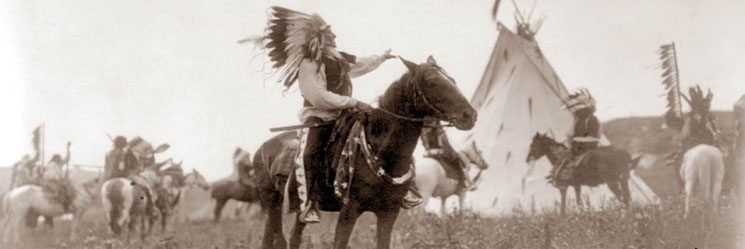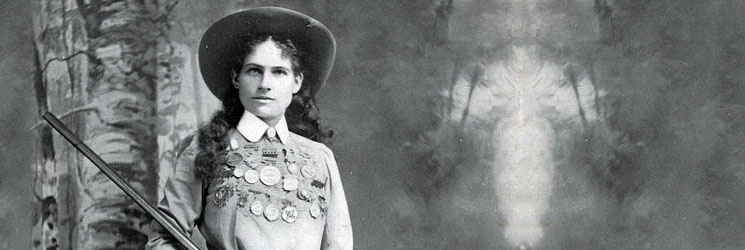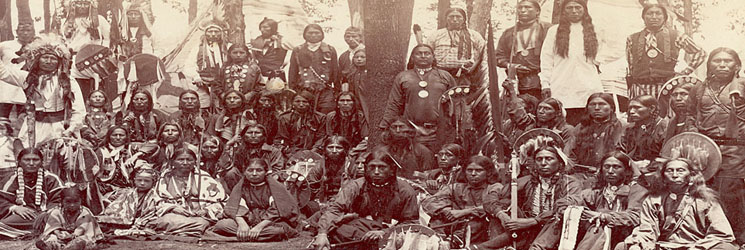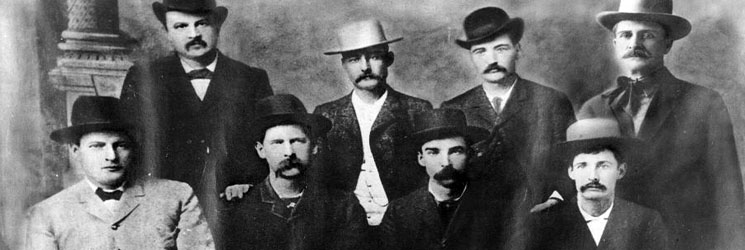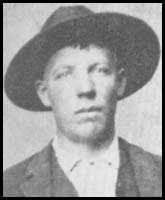
Thomas Coleman Younger (January 15, 1844 – March 21, 1916) was a famous Confederate guerrilla and an outlaw after the American Civil War.
With his brothers Jim, John and Bob Younger, he joined with Jesse and Frank James to lead the James-Younger Gang of Missouri bandits, although the precise date is not known. The first mention of his involvement came in 1868, when authorities identified him as a member of a gang who robbed Nimrod Long & Co., a bank in Russellville, Kentucky. Jesse and Frank James were also suspected of taking part in that robbery, though Jesse would not be publicly identified as an outlaw until December 1869, after the robbery of a bank in Gallatin, Missouri, and the murder of the cashier, John W. Sheets.
Witnesses repeatedly gave identifications that matched Cole Younger in robberies carried out over the next few years, as the outlaws robbed banks and stagecoaches in Missouri and Kentucky. On July 21, 1873, they turned to train robbery, derailing a locomotive and looting the express car on the Rock Island Railroad in Adair, Iowa. Younger and his brothers were also suspects in hold-ups of stage coaches, banks, and trains in Missouri, Kentucky, Kansas, and West Virginia.
Following the robbery of the Iron Mountain Railroad at Gad’s Hill, Missouri, in 1874, the Pinkerton National Detective Agency began to pursue the James and Younger brothers. Two agents (Louis J. Lull and John Boyle) engaged John and Jim Younger in a gunfight on a Missouri road on March 17, 1874; Boyle fled the scene, and both John Younger and Lull were killed. Simultaneously, another agent who pursued the James brothers was abducted and later found dead alongside a rural road in Jackson County, Missouri.
The James and Younger brothers survived for so many years, in contrast to most Western outlaws, because of their strong support among former Confederates. Jesse James became the public face of the gang, appealing to the public in letters to the press (even press releases left behind at robberies), claiming to be the victim of vindictive Radical Republicans. The gang, and Jesse James in particular, became a major electoral campaign issue, as pro-Southern Democrats defended the outlaws and Republicans attacked them.
September 7, 1876 – the James-Younger gang attempted to rob a bank in Northfield, Minnesota. Cole Younger and his brother Bob would both later say that they selected the bank because of its connection to two former Union generals and Radical Republican politicians, Benjamin Butler and Adelbert Ames. Three of the outlaws entered the bank, as the remaining five, led by Cole Younger, remained on the street to provide cover. The crime soon went awry when townspeople sent up the alarm and ran for their guns.
Younger and his brothers began to fire in the air to clear the streets, but the townspeople (shooting from under cover, through windows and around the corners of buildings) opened a deadly fusillade, killing gang members Clell Miller and Bill Chadwell and badly wounding Bob Younger through the elbow. The outlaws killed two townspeople, including the acting cashier of the bank, and fled empty-handed.
As hundreds of Minnesotans formed posses to pursue the fleeing gang, the outlaws separated. The James brothers made it back to Missouri, but the three Youngers (Cole, Bob, and Jim) did not. They and another gang member, Charlie Pitts, waged a gun battle with a local posse in a wooded ravine along the Watonwan River west of Madelia, Minnesota. Pitts was killed, and Cole, Jim, and Bob Younger were badly wounded and captured. Cole later said “We tried a desperate game and lost. But we are rough men used to rough ways, and we will abide by the consequences.”
Cole, Jim and Bob pleaded guilty to their crimes to avoid being hanged. They were sentenced to life in prison at the Stillwater Prison on November 18, 1876. Frank and Jesse James fled to Nashville, Tennessee, where they lived peacefully for the next three years.
In 1879, Jesse returned to a life of crime, ending in his murder on April 3, 1882, in Saint Joseph, Missouri. Frank James surrendered to Missouri Governor Thomas T. Crittenden on October 4, 1882 and eventually was acquitted. He lived quietly and peacefully thereafter.
Bob Younger died in Stillwater prison on September 16, 1889 of tuberculosis. Cole and Jim were paroled on July 10, 1901, with the help of the prison warden.
Jim committed suicide on October 19, 1902. Cole wrote a memoir that portrayed himself as a Confederate avenger more than an outlaw, admitting to only one crime, that at Northfield. He lectured and toured the south with Frank James in a wild west show, The Cole Younger and Frank James Wild West Company in 1903. On August 21, 1912, Cole declared that he had become a Christian and repented of his criminal past.
Frank James died February 18, 1915. A year later, Cole Younger died March 21, 1916, in his home town of Lee’s Summit, Missouri, and is buried in the Lee’s Summit Historical Cemetery.

